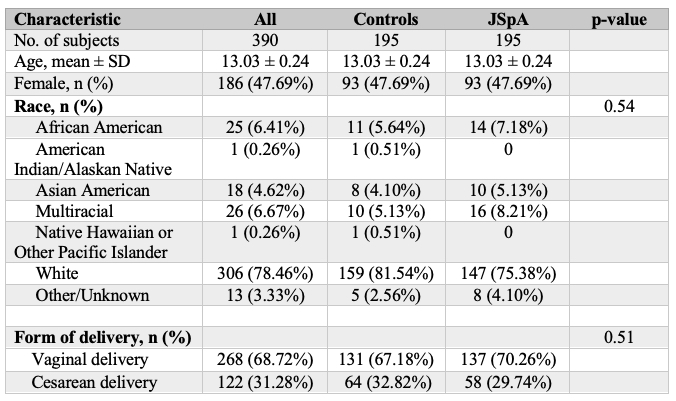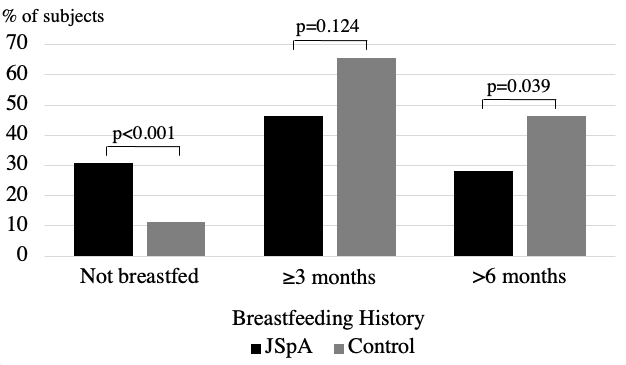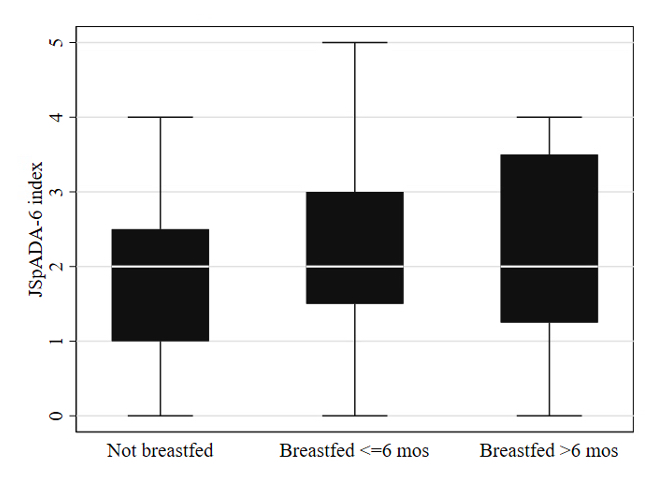Session Information
Session Type: Abstract Session
Session Time: 4:00PM-5:30PM
Background/Purpose: The pathogenesis of juvenile spondyloarthritis (JSpA) is multifactorial, and includes a genetic predisposition of the HLA-B27 allele, and environmental exposures such as the microbiome. Breastfeeding during infancy is the most robust source of microbiome colonization and differs markedly from the microbiota offered through formula feeding. Early breastfeeding practices are associated with the development of various autoimmune conditions, though this was yet to be investigated in JSpA. This study aims to evaluate 1) differences in parent-reported infant feeding type and duration between children with JSpA and matched controls and 2) if an association exists between early nutrition practices and JSpA disease severity at presentation.
Methods: This retrospective case-control study included 195 children with JSpA and 195 age- and sex-matched healthy controls. Demographics and early nutrition practices of cases and controls were parent-reported via electronic questionnaires. The type and duration of feeding was limited to the first 6 months of life and included the options of breastmilk only, breast and formula, formula only, breast and cereal or other food, or “other”. Between-group comparisons were made using the Pearson’s χ2 or Fisher’s exact test. JSpA disease activity was quantified by the modified JSpA disease activity-6 (JSpADA-6) index, a validated tool consisting of patient- and physician-reported measures (score range 0-6). Components of the JSpADA-6 index were collected as part of a JSpA registry. Linear regression was used to assess the association of JSpA disease activity at the index visit and infant feeding type and duration. Index visit was defined as the first visit in the JSpA registry that occurred within 6 months of diagnosis or prior to the initiation of disease-modifying antirheumatic drugs or biologic therapy.
Results: For each group of 195 controls and 195 cases, the mean age was 13.03 ± 0.24 years and 47.69% were female (Table 1). Of the healthy controls and children with JSpA, 88.72% and 69.23% were exposed to breastfeeding of any duration, respectively (p< 0.001).The frequency of exclusive breastfeeding for longer than 6 months was significantly lower in children with JSpA than in healthy controls (28.36% of children with JSpA vs 46.47% of healthy controls; p=0.039; figure 1). There was no significant difference in form of delivery, vaginal or cesarean delivery, between children with JSpA and healthy controls. The JSpADA-6 index and parent-reported breastfeeding duration was available for 103 JSpA patients at the index registry visit, a median of 0.3 months after diagnosis (IQR 0-9.4). The median JSpADA-6 index was 2 (IQR: 1.5-3; range: 0-5) and was not significantly different in children with a history of no breastfeeding and exclusive breastfeeding for ≤6 months (β=0.13, 95% CI: -0.39-0.66) or exclusive breastfeeding for >6 months (β=0.21, 95% CI: -0.41-0.84).
Conclusion: This study suggests a potential association of early breastfeeding practices and the occurrence of JSpA. A shorter duration of exclusive breastfeeding or absence of breastfeeding was higher in cases with JSpA than controls. Breastfeeding for >6 months was not associated with JSpA disease severity at diagnosis.
To cite this abstract in AMA style:
Baggett K, Brandon T, Xiao R, Weiss P. Decreased History of Breastfeeding During Infancy in Juvenile Spondyloarthritis: A Case-Control Study [abstract]. Arthritis Rheumatol. 2023; 75 (suppl 9). https://acrabstracts.org/abstract/decreased-history-of-breastfeeding-during-infancy-in-juvenile-spondyloarthritis-a-case-control-study/. Accessed .« Back to ACR Convergence 2023
ACR Meeting Abstracts - https://acrabstracts.org/abstract/decreased-history-of-breastfeeding-during-infancy-in-juvenile-spondyloarthritis-a-case-control-study/



